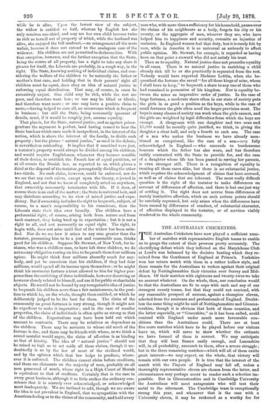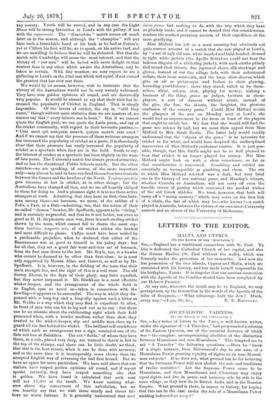THE AUSTRALIAN CRICKETERS.
THE Australian Cricketers have now played a sufficient num- ber of matches with representative English teams to enable us to gauge the extent of their prowess pretty accurately. The electrifying defeat which they inflicted on the Marylebone Club at Lord's was balanced by the decisive beating which they re- ceived from the Gentlemen of England at Prince's. Yorkshire won her return match with them in a rather hollow style, and there remain for the Australians to reckon against their original defeat by Nottinghamshire their victories over Surrey and Mid- dlesex. Of their matches with eighteens and twenty-twos we take no account whatever. On the whole, then, our conclusion would be that the Australians are fit to cope with each and any of our strongest county teams, but that they could not contend, with any reasonable prospect of success, against a champion eleven, selected from the amateurs and professionals of England. Doubt- less the same thing might be said of Nottinghamshire and Glouces- tershire, though it is obvious that both of these counties, and the latter especially, or " Graceshire," as it has been called, could contend with England under much more favourable con- ditions than the Australians could. There are at least five more matches which have to be played before our visitors leave us, which will serve to show whether the estimate we have formed of them is correct. We may anticipate that they will beat Sussex easily enough, and Lancashire will, in all probability, succumb to them, after a severe struggle ; but in the three remaining matches—which will all of them excite great interest—we may expect, on the whole, that victory will remain with our own people. It is true that the interest of the match with the Players of England may fall off, unless a thoroughly representative eleven are chosen from the latter, and circumstances may perhaps occur to render such a selection im- possible. But in Gloucestershire and in Cambridge University the Australians will meet antagonists who will test their metal to the uttermost. The Cambridge team is exceptionally strong this year, and whenever that is the case with a University eleven, it may be reckoned as a worthy foe for any county. Youth will be served, and in any case the Light Blues will be strong favourites at Lord's with the gallery, if not with the cognoscenti. The " Graceshire " match comes off much later on in the season, and although the " champion " will not have such a formidable band at his back as he had at Prince's, yet at Clifton his foot will be, so to speak, on his native turf, and we are unwilling to believe that he will be defeated. But that the match with Cambridge will cause the most interest, and that the victory of "our men" will be hailed with more delight in that contest than in any other which awaits the Australians, may be taken as certain. With fine weather, we may expect to see a gathering at Lord's on the 22nd inst. which will equal, if not exceed the greatest that has ever met there.
We would by no means, however, wish to insinuate that the victory of the Australians would not be very warmly welcomed. They have won golden opinions all round, and are deservedly very popular. It would be absurd to say that their visit has in- creased the popularity of Cricket in England. That is simply
impossible. Of the lovers of cricket, the cry is, "still they come," though without more statistics than we are masters of, we cannot say that "every minute one is born." But if we cannot quote the English poet, we can quote the Latin poem, and say of the cricket community, with regard to their favourite pastime,— "0 Cras amet qui nunquam amavit, quique amavit eras amet." And if we cannot say that the presence of these welcome strangers has increased the popularity of cricket as a game, it is abundantly clear that their presence has vastly increased the popularity of cricket as a spectacle when they are in the field. Sooth to say, the interest of cricket as a spectacle has been slightly on the wane of late years. The University match has always proved attractive, and so has the threatened Public Schools match. But the other matches—we are speaking, of course, of the more important only—may almost be said to have resolved themselves into contests between the Graces and the bowlers of the North. Toujours perdrix gets tiresome at last in cricket, as in other things ; but the Australians have changed all that, and we are all heartily obliged to them for doing so. And a pleasant sight it is to see these active strangers at work. Admitting that they have no first-class bats- man among them—no batsman, we mean, of the calibre of a Felix, a Parr, or a Daft—admitting, too, that the action of their so-called " demon " bowler, Mr. Spofforth, appears to be " tiring," and is certainly ungraceful, and that he is not better, nor even so good as H. H. Stephenson once was, there is much sterling cricket shown by the team, which cannot fail to charm the most cap- tious laudator temporis acti, of all cricket critics the hardest and most difficult to please. Caffyn must have been misled by a pardonable prejudice, when he declared that either of the Bannermans was as good as himself in his palmy days ; but for all that, they are a good fair wear-and-tear set of batsmen, from the first man down to the last. Mr. Boyle, too, is a bowler who cannot be deemed to be other than first-class ; he is most ably supported by Messrs. Allan and Garrett, as well as by Mr. Spofforth. It is, however, in the fielding of the team that their main strength lies, and the sight of this is a real treat. The old Surrey Eleven, in the days of their glory, may have equalled, but they never surpassed it. Mr. Blackham is a most effective wicket-keeper, and the arrangement of the whole field is to English eyes as novel as—taken in connection with the bowling—it appears to be successful. The way in which they dis- pensed with a long-leg and a long-slip against such a hitter as Mr. Webbe is a way which they may find it expedient to alter, in front of men who can bit to leg and cut as he can ; but there Scan be no mistake about the exhilarating sight which their field 'presented when, with a bowler medium rather than slow, they trusted to the wicket-keeper, slip and middle man close up to guard all the line behind the wicket. The brilliant self-confidence of which such an arrangement was a sign, reminded one of the thin red line at Balaklava. The out "fields," of whom they have three, as a rule, placed very deep, are trained to throw in full to the top of the stumps, and there can be little doubt, we think, that this is the best return, when it can be done with accuracy, and at the same time it is incomparably more showy than the accepted English way of returning the ball first bound. But we have no space for more particulars. We have said above that our 'visitors have reaped golden opinions all round, and if report speaks correctly, they have reaped something else that is golden. We have heard it calculated that each man will net £1,500 as the result. We know nothing what- ever about the correctness of this calculation, but we can heartily say that we wish these sturdy and clever fel- lows no worse fortune. It is generally understood that aura sacra fames had nothing to do with the trip which they have so pluckily made, and it cannot be denied that this consideration renders the marked pecuniary success of their expedition all the more gratifying.
Miss Mitford has left us a most amusing but obviously not quite correct account of a match that she saw played at Lord's, by "a set of ugly old men, white-headed and bald-headed, dressed in tight white jackets (the Apollo Belvidere could not bear the hideous disguise of a cricketing jacket), with neck-cloths primly tied round their throats, fine japanned shoes, silk stockings and gloves, instead of our fine village lads, with their unbuttoned collars, their loose waistcoats, and the large shirt-sleeves, which give an air so picturesque and Italian to their glowing, bounding youthfulness ; there they stand, railed in by them- selves, silent, solemn, slow, playing for money, making a business of the thing, grave as judges, taciturn as chess- players, a sort of dancers without music, instead of the glee, the fun, the shouts, the laughter, the glorious confusion of the country game." Could Miss Mitford revisit the glimpses of the sun on Monday next at Lord's, she would find an improvement in the dress at least of the players that ought to satisfy her. We fear that she would still find the game too solemn by half, but we must then appeal from Miss Mitford to Mrs. Sarah Battle. The latter lady would readily understand that the "rigour of the game" is as necessary for cricket as for whist, and would have despised the undisciplined manoeuvres of Miss Mitford's exuberant rustics. It is just pos- sible, though, that Mrs. Battle might not be so well pleased to hear that cricket is no longer played for money. But Miss Mitford might look on with a clear conscience, so far as that consideration is concerned. Gambling and cricket are essentially as incompatible as gambling and chess. The era to which Miss Mitford referred was a dark, but very brief one in the history of our national game, and Monday's victors, whether Cantabs or Australians, will not carry off even the humble crown of parsley which contented the modest wishes of the old Greek athletes. We trust, however, that both will carry off a " sunny memory," which may serve as the first link of a chain, the last of which may be—who knows ?—a match played in Australia, between the victors of our own inter-University contest and an eleven of the University of Melbourne.



































 Previous page
Previous page